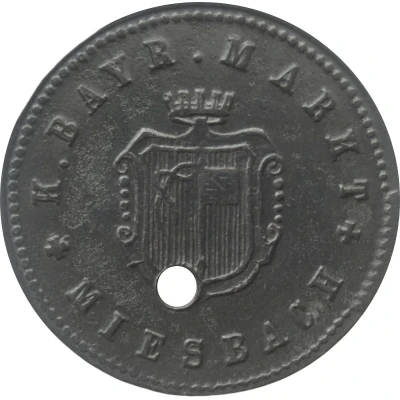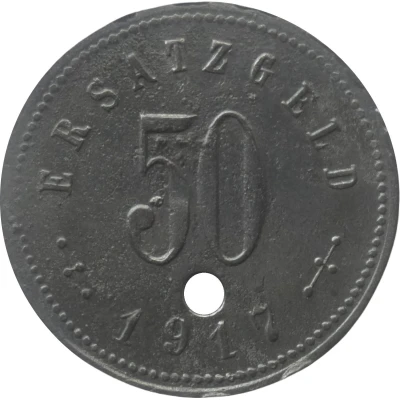


© Willem63 (CC BY-NC-SA)
50 Pfennigs - Miesbach
1917 year| Zinc | 1.92 g | 22.0 mm |
| Issuer | City of Miesbach (Federal state of Bavaria) |
|---|---|
| Emperor | William II (Wilhelm II) (1888-1918) |
| Type | Standard circulation coin |
| Year | 1917 |
| Value | 50 Pfennigs (50 Pfennige) (0.50) |
| Currency | Mark (1914-1924) |
| Composition | Zinc |
| Weight | 1.92 g |
| Diameter | 22.0 mm |
| Thickness | 1.0 mm |
| Shape | Round with a round hole |
| Technique | Milled |
| Orientation | Medal alignment ↑↑ |
| Demonetized | Yes |
| Updated | 2024-10-04 |
| Numista | N#346422 |
|---|---|
| Rarity index | 97% |
Reverse
Beaded rim, legend and date surround denomination centered
Script: Latin
Lettering:
ERSATZGELD
50
1917
Edge
Reeded
Interesting fact
The 50 Pfennigs coin from Miesbach, Bavaria, issued in 1917, is interesting because it was made of zinc, a material that was commonly used for coinage during World War I due to its low cost and durability. This coin, weighing 1.92 grams, was a significant change from the previous 50 Pfennigs coin, which was made of silver. The use of zinc in coinage during this time period was a result of the wartime economy and the need for more affordable materials. This coin is a unique example of how currency can reflect the economic and historical context in which it was created.